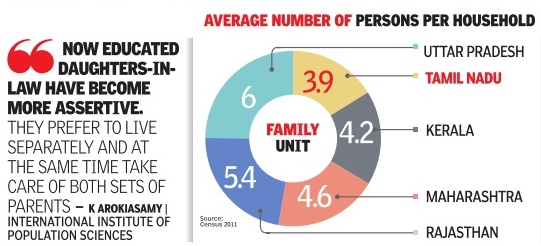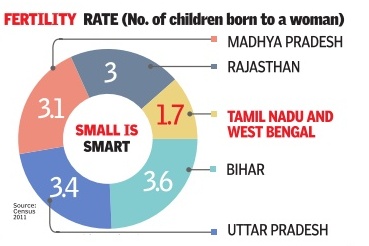Household structure: Tamil Nadu
This is a collection of articles archived for the excellence of their content. |
2011
The Times of India, Aug 03 2015


Sivakumar B
Latest census figures show Tamil Nadu has the smallest family unit in the country. Lifestyle changes, falling fertility rate are responsible for households shrinking in size, even as elders live apart to allow nextgen more space.
The nuclearisation of the Tamil Nadu household is complete. According to the 2011 Census, the state has an average 3.9 persons per household, which makes it the smallest family unit in the country. Young couples increasingly prefer to live away from their parents, but often in the same city or town.
The elders, rooted in their traditions and beliefs, prefer to cede space to younger couples who carve out an independent, even cosmopolitan way of life. Living on their own, unshackled by the constraints of a joint family's demands, the `now' generation adopts individualistic lifestyles, thanks to growing in comes and consuming habits.
Says International Institute of Population Sciences professor K Arokiasamy, “There are several reasons for Tamil Nadu having larger number of small households. Primary among them is the falling fertility rate in the state in the last few decades owing to awareness about family planning and contraception. This gives rise to smaller families.“ An assessment of the 2011 census shows that fertility rate in Tamil Nadu is 1.7 (the average number of children a woman can bear). The rate has been declining each decade.While it was 3.9 in 1971, it reduced to 2 in 2001 and to 1.7 in 2011.
The data reflects the social and economic transition from a large family structure with fixed incomes to one in which an upwardly mobile couple lives independently and chooses to have one or a maximum of two children. The atomisation of the family unit has also led to changes in lifestyle.“Earlier in a joint set-up, the son's family used to dominate and the daughterin-law would be forced to adjust. But.now, better educated and working daughters-in-law have become more assertive regarding the way they dress, what they eat and how they entertain. They prefer to live separately and at the same time take care of both sets of parents,“ said sociologist G K Karanth.
From poor couples receiving old age pension to the middle class who rely on savings and the affluent elderly, an in creasing number of geriatrics do not wish to be a hindrance anymore to their sons or daughters-in-law.